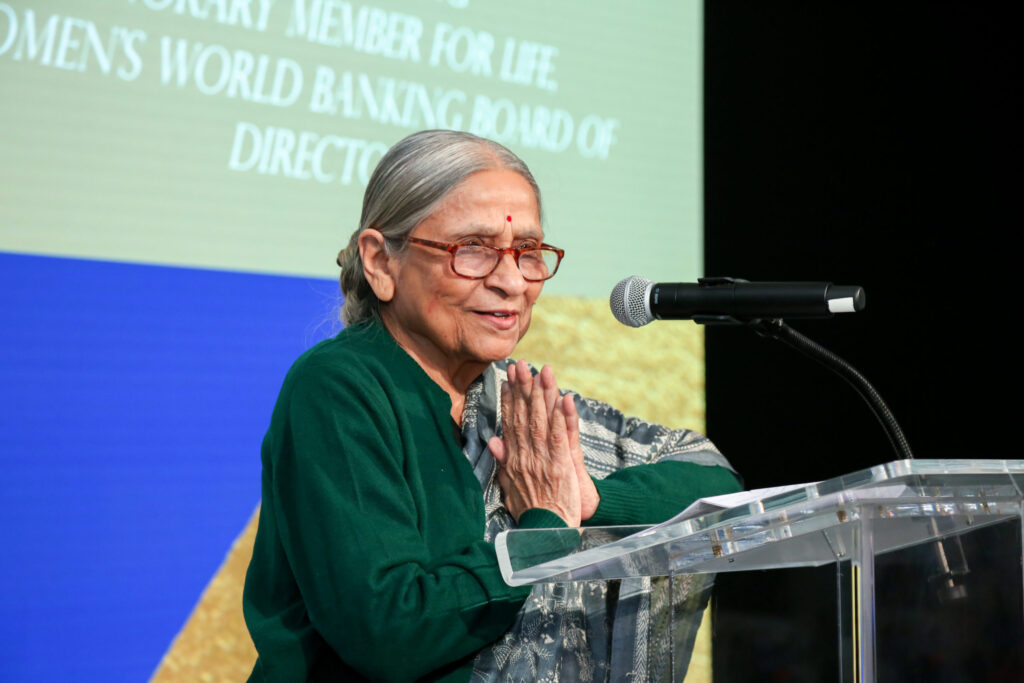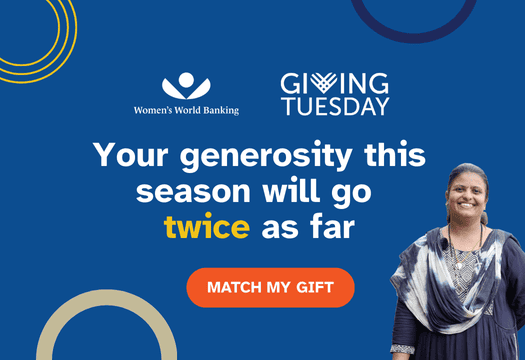To celebrate Women’s World Banking’s 45th anniversary, we are showcasing the voices of individuals from around the world who have shaped and touched Women’s World Banking journey since its inception in 1979 at Commission on the Status of Women to today!
These are stories from across Women’s World Banking’s reach from the women we serve and our customers, to allies and women in leadership who have contributed to women’s economic empowerment and financial inclusion.
Meet Ms. Ela Ramesh Bhatt. Known affectionately as Elaben (“-ben” meaning “sister”), she was a true pioneer in advancing women’s empowerment and financial inclusion—first, in her home country of India, and then around the globe. She also went on to serve as a Founding Member of Women’s World Banking from its creation in 1979, together with other luminaries including Michaela Walsh, Esther Ocloo and Mary Okelo. Ms. Bhatt served as our Chair of the Board of Trustees for nearly 20 years, and then as an Honorary Member of the Board for Life before she passed away in November 2022.
While working as a teacher early in her career in the city of Ahmedabad, Ms. Bhatt realized that self-employed women were routinely denied many of the rights men were afforded to develop their livelihoods. She began to help low-income women secure fair wages and build pathways out of poverty, ultimately founding the Self Employed Women’s Association (SEWA) in 1972, followed by the Cooperative Bank of SEWA in 1973. The bank lends working capital to women entrepreneurs and helps them to build assets, save and borrow. “Poverty will never be removed without participation of women,” Ms. Bhatt has said. By offering financial products tailored to women, including savings, fixed deposits, pensions, loans and insurance, the bank ensures that women are treated with the respect and service that they deserve.
These efforts are still a remarkable demonstration of strength in numbers; the bank was started by 4,000 women who each contributed ten rupees, and SEWA became one of the region’s largest cooperatives for women, offering benefits like health insurance, retirement accounts and training to those who had never before had a safety net. SEWA has been helping women for more than 50 years access the financial tools and resources they need to build more secure, prosperous and fulfilling lives. Currently, the organization has 2.9 million poor, self-employed women members working in the informal economy across 18 states in India.
Remembered as a “gentle revolutionary,” Ms. Bhatt embodied the Gandhian principles that she grew up with; her grandparents were involved with Mahatma Gandhi’s nonviolent campaigns. She believed that self-reliance was key to eradicating poverty and that local, grassroots solutions were crucial to these efforts. “Poverty is a form of violence; it does not respect human labor, it strips a person of humanity, and it takes away their freedom,” she said in her acceptance speech after being the first recipient of the Global Fairness Initiative’s Global Fairness Award in 2010.
“Where there is poverty, there is injustice. There is exploitation—of the individual, of the community and of the environment. Where there is poverty, there is discrimination. Where there is poverty, there is fear and intimidation in the community, in the family, in the work environment. Where there is poverty, we can assume rigid hierarchy and inequality. Consequently, where there is poverty, there is also enormous vulnerability.”
Ms. Bhatt was a founder or member of many progressive and innovative groups and organizations working toward equality, independence and self-reliance for poor communities—and for poor women in particular. She was a member of the Indian Parliament (Rajya Sabha), and subsequently became the first female member of the Indian Planning Commission. She was also a founding member of The Elders, a group of world leaders formed by Nelson Mandela, where she was especially involved in issues of gender equality, including ending child marriage.

Additionally, Ms. Bhatt was appointed to the board of the Reserve Bank of India in 2011, and co-founded and/or served as Chairperson for the Indian School of Microfinance for Women; the International Alliance of Home-based Workers (HomeNet); Women in Informal Employment: Globalizing, Organizing (WIEGO), and others. She was a trustee of the Rockefeller Foundation for more than a decade, and won numerous awards for her leadership and advocacy, including the Indira Gandhi Prize for Peace. She also earned honorary doctorate degrees from Harvard University, Georgetown University and Brussels University.
Ms. Bhatt undeniably and proudly dedicated her life to rectifying the unjust treatment of women by offering bold approaches that led to big changes, positively impacting the lives of women not only in India, but around the world. She managed to challenge the status quo with tangible, measurable solutions, while always staying peaceful and focused on her mission to help low-income women—“the poorest among the poor,” she said—rise out of poverty to support themselves, their families and their communities.
Women’s World Banking has changed the lives of millions of women, transforming their households, businesses and communities, and driving inclusive growth globally through financial inclusion.
Today, using our sophisticated market and consumer research, we turn insights into real action to design and advocate for policy engagement, digital financial solutions (see Blanca’s story here), workplace leadership programs, and gender lens investing.
Help us reach the nearly billion women still excluded from the formal financial system. Donate now.




